Financial Support
Financial support of graduate students is provided in the form of research assistantships, teaching assistantships, and fellowships. Historically, all graduate students in good standing have received full financial support (tuition and stipend) for the duration of their graduate studies at Stanford.
First-year students (except those with fellowships) usually receive teaching assistantships for three quarters, which provide a stipend plus full payment of tuition. Support in summer months and in succeeding years is typically provided through research assistantships or fellowships. First-year students for the '23-24 AY (academic year) will receive no less than $52,092 for the first year plus tuition support. Post first-year students earn no less than $51,600 over four quarters plus tuition support for '23-24 AY.
Teaching opportunities for first-year students include classroom or laboratory instruction. These require about 15-20 hours per week for three quarters, and are specifically arranged so as not to interfere with normal academic progress. Sources of funding for research assistantships include grants from the National Science Foundation, the National Institute of Health, the Department of Energy, and the Department of Defense in addition to industrial contracts, corporate gifts, and Departmental fellowships.
In addition to the students on national fellowships, the Chemistry Department will nominate its top 10 applicants for the prestigious Stanford Graduate Fellowship. This institutional fellowship will provide the recipients with full tuition support as well as stipend at a level competitive with the national fellowships. As Stanford Graduate Fellows, the recipients will also enjoy exclusive events and lectures organized by Stanford and the School of Humanities and Sciences. For more information about the SGF, please visit the Stanford Graduate Fellowships website.
Additionally, Stanford's Knight-Hennessy Scholars program awards up to 100 high-achieving students every year with full funding to pursue a graduate education at Stanford, including the PhD in Chemistry. To be considered, you must apply to Knight-Hennessy Scholars by October 9, 2024.
Details of student financial support are provided in a separate letter following admission. Stipends are set such that the students' net income is equivalent to the net income received at other major universities, and is consistent with the cost of living in the Stanford area. Additionally, first-year students arriving from distant locations may receive a travel allowance to partially defray the cost of necessary travel.
The Chemistry Department is committed to providing salary/stipend and tuition for Chemistry Ph.D. students who are in good academic standing, working for chemistry professors. Chemistry students receive support from three different sources: Teaching Assistantships (TA), Research Assistantships (RA), and fellowships. Salaries and tuition benefits depend on the sources of funding received. Students with a 50% assistantship cannot work more than eight additional hours a week at a part-time job. During breaks (e.g. between quarters and summer) students can work more than eight hours a week at a part-time job.

Support Sources for Doctoral Students
The University sets the fixed TA salary rate for each teaching category (e.g., teaching assistant or affiliate) and percent appointment. TAs are paid semi-monthly and the appointment includes tuition benefits. Chemistry’s total TA budget is set by the Dean of H&S and is related to course enrollments.
The University sets the minimum RA salary, and departments have the option of paying above this minimum. In Chemistry, it is Department policy that all RAs be paid the same departmentally approved salary. RAs are paid semi-monthly, and normally the research advisor pays them from his/her research grants.
Including salary, tuition benefits, and indirects, but excluding laboratory supplies, it cost more than $100,000/year to support each student on a grant. Including supplies and equipment, a typical grant in Chemistry supports one or two graduate students a year. Research grant budgets are set at the time of award, leaving almost no room for subsequent RA salary adjustments outside of University-projected annual rate increases. Most grants run for three years. Continuing RA support depends on continued success at winning new and renewed grants.
External - Stipends vary, amounts are set by the funding institution (e.g., NSF, Hughes, Hertz, Dept of Defense, etc.). Typically students are paid quarterly at the beginning of each quarter in a lump sum, and usually fellowships cover three years of support.
Internal - Students without TA, RA, or other support are paid from the Department’s endowed fellowship funds. For convenience, these students are often referred to as “RAs”. They receive a quarterly stipend equivalent to the Department RA salary. Including stipend and tuition, it cost approximately $60,000/year to support a (non-TGR) student on fellowship. Use of the Department’s endowed fellowship funds is restricted by the terms of the individual endowments (e.g., to field of specialization). The major use of these funds has always been to support students of junior faculty who are still developing a research grant support base.
A 50%-time appointment is the maximum TA, RA, or TA/RA-combined appointment for a graduate student in chemistry. Fellows do not have percent appointments. A 50% TA or RA appointment carries with it eight, nine, or ten units of tuition credit which covers normal registration for a graduate student. Lesser TA and RA appointments are possible at adjusted salaries and tuition credits.
Normal practice in Chemistry is to support students as TAs during their first three quarters, and as RAs thereafter, but this model is subject to change. The TA obligation to the Department is three 50% TA quarters and one Head TA (30%) or Advanced TA (20%). These numbers are reduced for those with fellowships. TA assignments are based on the needs of the Department and are at the discretion of the Department.
Support in Chemistry
Entering students normally are supported as TAs for three quarters (50%-time) and then an RA (50%-time) for one quarter, providing a minimum annual income based on the University TA and RA salary rates. First-year students on external fellowships are typically TAs for only one quarter. The TA salary supplements the fellowship stipend, but caps on allowable supplementation limit TA opportunities for Fellows.
After the first academic year, graduate students in Chemistry are normally supported as RAs for four quarters each year, providing a minimum annual income based on the University RA salary rates.
After the first year, graduate students must serve, one time, as advanced MTAs, head MTAs, or instrument TAs. There are over 50 part-time MTA positions, accommodating some 27% of advanced students. These fall under the Mentor Teaching Affiliate rates mandated by the University.
Financial Aid
The Lowy Fund is designated as loans for chemistry and medical school graduate students. Because of the high cost of living in the Bay Area, the University may continue an interest-free, short-term loan program designed to help graduate students with cash flow problems associated with moving off campus (e.g. security deposit, first and last month rent). Contact the Financial Aid Office (Montag Hall) for information on loans.
A program was developed in 1983 to help meet the problems of doctoral students with unusual financial hardships. Students admitted to study for a doctoral level degree (PhD, DMA, EDD) in the Schools of Earth Sciences, Education, Engineering, Humanities & Sciences, and Medicine (PhD programs) are eligible to apply. Applications are encouraged from students experiencing an unexpected financial hardship, associated particularly with new family or medical circumstances, who cannot reasonably be expected to alleviate the financial difficulty through fellowship or loan sources.
The grant is not intended to be used as complete support for students where other sources of aid have ceased, nor can grants be made for dissertation costs under this program. All students applying for these funds must have their basic support covered from another source. Preference in awarding will be given to students who have made satisfactory progress and are well advanced in their program, with an established expected degree date. Applications may be obtained in the Financial Aid Office.
For additional information, see also:
- Payments and Tuition Credits
- Tax Statements from the University
- Staff & Faculty Directory
- Disability Accommodations
- Diversity, Equity, and Inclusion Committee
- Major Awards
- Our Community Values
- Our History
- Quality of Life Committee
- Areas of Research
- Facilities and Centers
- Instructors
- Postdoctoral Research and Resources
- Graduate Program
- Undergraduate Programs
- Chemistry Undergraduate Teaching Laboratory
- Our Chemistry Education Office
- Elementary Schools
- High Schools
- Community Relations and Outreach
- Contact our Development Officer
- Funds to Support
- Meet Our Major Supporters
The Cost of Graduate School
The Cost of Applying to Graduate School
There is a $75 application fee for all applicants to the PhD program. We offer application fee waivers to domestic applicants who meet our requirements. For further information please visit the Application Fee Waiver section. If you are interested in receiving a fee waiver, you must apply for one before the application deadline; once the fee waiver has been paid for, it is not possible to refund.
Unfortunately, the Chemistry Department can only waive the $75 application fee for international applicants if they have already applied and paid an application fee for another PhD program at MIT in the same admission cycle.
Applicants whose primary language is not English must take the TOEFL or IELTS exam and report their official scores. The MIT reporting code is 3514, and the department code is 62. We can waive the TOEFL/IELTS requirement for international applicants who have completed 3 or more years in a degree-granting program instructed exclusively in English, or who consider English to be their primary language.
The Cost of Attending Graduate School
Once the application fees are behind you, there are still some costs associated with attending graduate school, such as:
- Tuition, fees, & insurance
- Room & Board (on- or off-campus)
- Conference, training, and research travel costs
- Cost of living
All students admitted to the PhD program receive full tuition coverage along with a monthly stipend for the first academic year, either through Teaching Fellowships, Research Assistantships, or fellowships. Students must be eligible to work in the United States in order to receive funding. After the first year, continued funding is provided for the duration of the PhD program, subject to the availability of funds for that purpose, as long as students remain in good academic standing.
All admitted Chemistry students receive:
- Base stipend for 12 months. Current stipend rates are available online.
- 100% tuition waiver.
- 100% health insurance subsidy for the Extended Insurance plan . Basic student health insurance is included in tuition; all PhD students receive Extended Insurance support. Students will be responsible for paying for spouses, dependents, co-pays and other fees for services.
Students are responsible for paying the Student Life Fee each term. Information about the current Student Life Fee is available online. This helps fund student clubs, organizations, and the sports and fitness center. This fee covers students’ unlimited access to the gym, fitness classes, student organization events, and trips.
Cambridge/Boston Area Cost of Living
Living costs in the Cambridge/Boston area are among the highest in the United States. It is important to carefully consider your living expenses prior to arrival.
Some resources to consider are below:
MIT Grad Admissions Estimated Living Expenses
MIT GSC Cost of Living Analysis
Grad Students & Family Housing
MIT ISchO: Cost of Living Information for Scholars Coming to MIT
MIT Living Wage Calculator
More information about Cambridge/Boston culture and resources are below:
MIT OGE Services & Resources
MIT Transportation
MIT MBTA Subsidy
MIT GSC Transportation Guide for MIT Grad Students
MIT ISO: Cultural Adjustment
MIT ISO: Explore Cambridge & Boston
PhD Stipend Survey Results
The living wage ratio (LW ratio) normalizes each gross pay entry to the local living wage. The purpose is to allow you to quickly compare the pay received by students at universities in different cost-of-living areas. See the FAQ for more information.
Show/Hide gross pay details.

Department of Chemistry
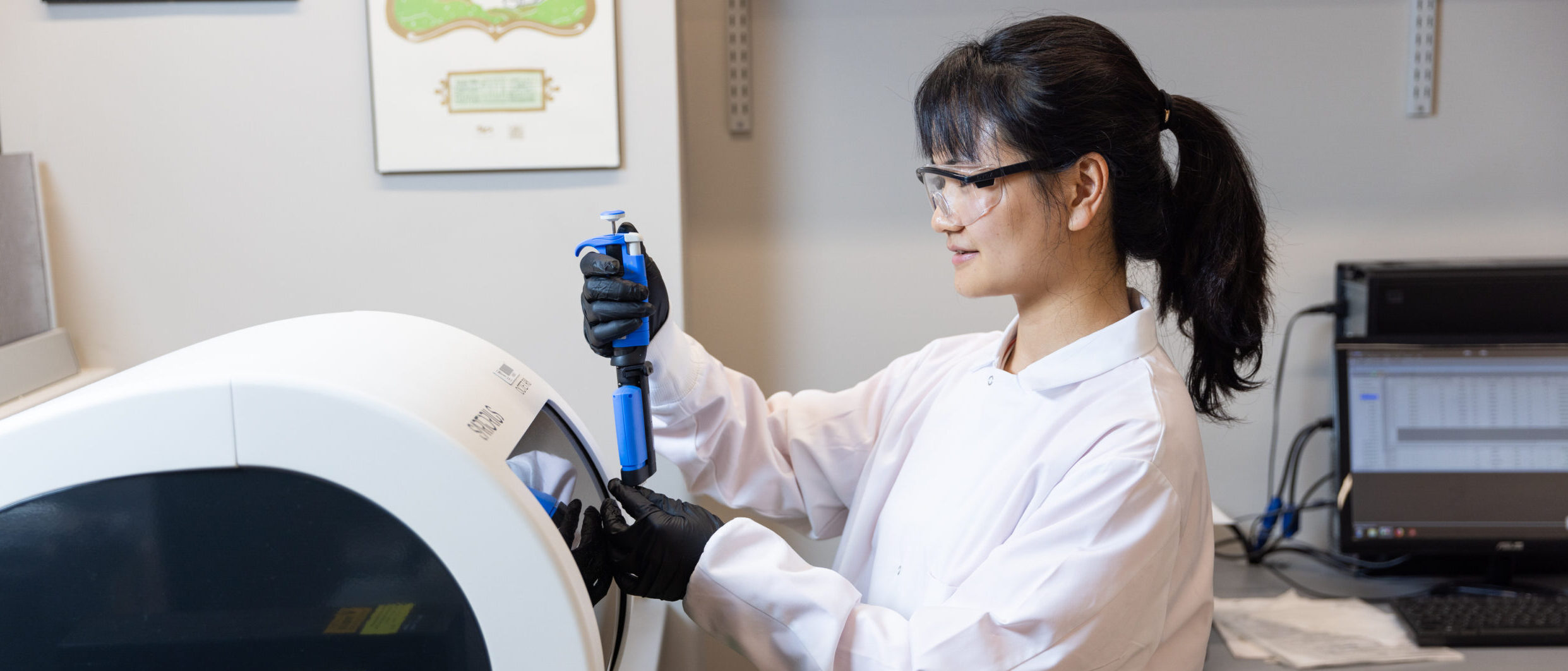
Graduate Aid and Awards
The graduate program in chemistry provides year-round financial support, guaranteed for five full years to all full-time graduate students in good standing. This financial support is typically in the form of fellowships, research assistantships, training grants, and/or teaching assistantships and includes tuition, health insurance, and a competitive stipend that helps cover living and transportation expenses.
For the 2024–2025 academic year, the support package is valued at more than $125,000/year:
- 100% tuition scholarship: $84,564
- Stipend: $36,500
- Paid health insurance: $4,158
Graduate applicants are reviewed by both the department and the Graduate School for additional fellowship opportunities. The values of these range from $5,000-$10,000 and are awarded based on candidate merit and a graduate school review process. Additional information regarding graduate tuition and fees can be found here .
NSF Graduate Research Fellowship Awardees and Honorable Mentions
The NSF Graduate Research Fellowship Program (GRFP) helps ensure the vitality of the human resource base of science and engineering in the United States and reinforces its diversity. The program recognizes and supports outstanding graduate students in NSF-supported science, technology, engineering, and mathematics disciplines who are pursuing research-based masters and doctoral degrees at accredited United States institutions.
Vanderbilt chemistry’s graduate students are highly competitive for NSF pre-doctoral fellowships.
GRFP Past Awardees
Madison T. Wright Vanderbilt Adviser(s): Lars Plate Undergraduate Institution: Jacksonville State University Awarding NSF Program: Life Sciences - Proteomics
Katherine M. Almasy Vanderbilt Adviser: Lars Plate Undergraduate Institution: North Carolina State University Awarding NSF Program: Chemistry - Chemistry of Life Processes
Kelsey R. Webb Vanderbilt Adviser: Lauren Buchanan Undergraduate Institution: University of Virginia's College at Wise Awarding NSF Program: Chemistry - Chemical Structure, Dynamics, and Mechanism
Megan E. van der Horst Vanderbilt Adviser: David Wright Undergraduate Institution: Hartwick College Awarding NSF Program: Chemistry - Chemical Measurement and Imaging
Jessica Paredes Vanderbilt Adviser: Kevin Schey Undergraduate Institution: New College of Florida Awarding NSF Program: Chemistry - Chemistry of Life Processes
Marissa Jones Vanderbilt Adviser: Richard Caprioli Undergraduate Institution: Southwest Baptist University Awarding NSF Program: Chemistry – Chemical Measurement and Imaging
Breyinn N. Loftin Vanderbilt Adviser: Eva Harth Undergraduate Institution: Hampton University Awarding NSF Program: Chemistry - Macromolecular, Supramolecular, and Nanochemistry
Kelly A. Richardson Vanderbilt Adviser: David Wright Undergraduate Institution: Middle Tennessee State University Awarding NSF Program: Chemistry - Molecular Diagnostics
Audrey E. Ynigez-Gutierrez Vanderbilt Adviser: Brian Bachmann Undergraduate Institution: University of Texas at San Antonio Awarding NSF Program: Chemistry – Chemistry of Life Processes
Michael S. Crocker Vanderbilt Adviser: Jeffrey Johnston Undergraduate Institution: University of Kentucky Awarding NSF Program: Chemistry - Chemical Synthesis
Laken L. Kendrick Vanderbilt Adviser: Eva Harth Undergraduate Institution: University of Southern Mississippi Awarding NSF Program: Materials Research - Biomaterials
Alexander Geanes Vanderbilt Adviser: Jens Meiler Undergraduate Institution: Purdue University Awarding NSF Program: Chemistry – Chemical Theory, Models and Computational Methods
Jade A. Bing Vanderbilt Adviser: Jeffrey Johnston Undergraduate Institution: Rider University Awarding NSF Program: Chemistry - Chemical Synthesis
Christine F. Markwalter Vanderbilt Adviser: David Wright Undergraduate Institution: Agnes Scott College Awarding NSF Program: Chemistry - Chemical Measurement and Imaging
Alexis Wong Vanderbilt Adviser: David Wright Undergraduate Institution: Furman University Awarding NSF Program: Chemistry - Chemical Measurement and Imaging
Amanda M. Duran Vanderbilt Adviser: Jens Meiler Undergraduate Institution: Texas State University - San Marcos Awarding NSF Program: Chemistry - Chemical Theory, Models and Computational Methods
Keersten M. Davis Vanderbilt Adviser: David Wright Undergraduate Institution: North Carolina State University Awarding NSF Program: Chemistry - Bioinorganic
Nicholas A. Wright Vanderbilt Adviser: David Wright Undergraduate Institution: Western Kentucky University Awarding NSF Program: Chemistry – Macromolecular, Supramolecular, and Nanochemistry
Vanessa Arredondo Vanderbilt Adviser: Jeffrey Johnston Undergraduate Institution: Vanderbilt University – undergraduate student, currently a Ph.D. candidate at UC, Irvine Awarding NSF Program: Chemistry - Chemical Synthesis
Andrew G. Harris Vanderbilt Adviser: Charles Lukehart Undergraduate Institution: University of South Alabama Awarding NSF Program: Chemistry - Materials
Brittany Allison Vanderbilt Adviser: Jens Meiler Undergraduate Institution: Xavier University of Louisiana Awarding NSF Program: Chemistry – Biophysical
Jessica P. Shackleford Vanderbilt Adviser: Jeffrey Johnston Undergraduate Institution: University of Southern Mississippi Awarding NSF Program: Chemistry - Organic
Honorable Mentions
Rachel A. Harris Vanderbilt Adviser: John McLean Undergraduate Institution: University of North Carolina at Chapel Hill NSF Program: Chemistry – Analytical Chemistry
Matthew T. Knowe Vanderbilt Adviser: Jeffrey Johnston Undergraduate Institution: College of Charleston NSF Program: Chemistry - Chemical Synthesis
Katherine M. Chong Vanderbilt Adviser: Gary Sulikowski Undergraduate Institution: Carnegie-Mellon University NSF Program: Chemistry - Chemical Synthesis
Katrina L. Leaptrot Vanderbilt Adviser: John McLean Undergraduate Institution: University of Charleston NSF Program: Chemistry - Chemical Measurement and Imaging
Nichole M. Lareau Vanderbilt Adviser: John McLean Undergraduate Institution: The College of New Jersey Chemistry - Chemical Measurement and Imaging
Kelly A. Gilmore Vanderbilt Adviser: Eva Harth Undergraduate Institution: College of the Holy Cross NSF Program: Chemistry - Chemical Theory, Models and Computational Methods
- PhD Stipends
Graduate Financial Aid

All PhD students receive a semi-monthly stipend payment to cover the basic cost of living in New Haven. The minimum annual stipends for the 2024-2025 academic year are:
- Humanities/Social Sciences: $49,538 stipend
- Physical Sciences: $49,538 stipend
- Biological & Biomedical Sciences: $51,046 stipend
Understanding the semi-monthly payroll process
First-year phd students.
Your first stipend payment is a significant milestone, and we want you to have a clear understanding of the payroll process. During your first year of study, your stipend will be disbursed in 25 semi-monthly payments. Graduate students are paid twice each month, on the 15th day and the last day of the month (or the Friday before, if it falls on a weekend or a holiday). After each payment, you should check your Workday profile to review your payslip. Select "Pay" from the menu and choose the payroll slip to view.
In your first stipend payment, you will also see a one-time relocation award of $1,000 included. This award is meant to assist you with the costs associated with moving to New Haven. This is a one-time payment and will not be included in your future stipend payments. Please keep this in mind when budgeting for your expenses, as your future stipend payments will not include this additional amount.
In the future, if you have on-campus employment or other one-time payments, you will also see these items reflected in your payslip. Your payslip may also change from term to term depending on your funding sources (i.e., teaching, research, university fellowship, etc.).
Continuing PhD students
As a continuing PhD student, you will receive your first stipend payment on September 15. Continuing student stipend payments are paid on a semi-monthly basis, on the 15th and the last day of the month (or the Friday before, if it falls on a weekend or holiday).
Direct Deposit
We encourage you to set up direct deposit of your stipend checks into a US bank account of your choice. This is the fastest and most convenient way to access your stipend each pay period.
If you are a new student, you may need to wait until after the start of your fellowship period and the creation of your payroll record to set up direct deposit of your stipend check. Any incoming student who has not set up direct deposit will have their checks sent to the Payroll Tax Form US mailing address listed in their student record.
To set up direct deposit, you must have a US bank account . Then follow these steps:
- Login to Workday using your NetID and password.
- Select the “Pay” widget on your Workday homepage.
- Next, select “Payment Elections.” From here, use the “Add” function to add a new account for direct deposit. You may add more than one account and you can choose how to allocate funds across your accounts.
Once you have set up direct deposit, it may take one or two pay periods to take effect. Until then, your stipend check will be mailed to you at the address you provide.
If you encounter difficulty with Workday, have questions about the direct deposit process, or how to view your stipend statements online, please contact the Employee Service Center at 203-432-5552 or via email ( [email protected] ).
Additional Financial Aid and student information can be found on the Yale Hub .
If you have any questions or concerns about your stipend, payslip, or other matters related to payment, please reach out to the Graduate Financial Aid Office.
- [email protected]
- 203-432-2739
- 246 Church Street, 2nd Floor
- Graduate Programs
Chemistry PhD
- Financial Support
Chemistry Ph.D. Program Support Policy
Our Ph.D. students (in good academic standing) currently receive an annual stipend of $34,000. In addition to the stipend, the full costs of tuition, fees, and health insurance are covered for all Ph.D. students. The total support package ranges between $47,019.18 to $63,121.18 annually, depending on residency status. Primary sources of support are the University of California block grants, training grants from federal agencies such as NIH and NSF, teaching assistantships, graduate fellowships, and faculty research funds. Students are expected to complete the Ph.D. in five years. Approvals by the Thesis Advisor and Department are required for support beyond the departmental time limits. To be eligible for support, doctoral students must meet university and departmental requirements for good academic standing. Students are encouraged to join a research group in the Department of Chemistry and Biochemistry to be guaranteed the full annual support level throughout their tenure in the program.
Eligible students (U.S. citizens and Permanent Residents) must establish California residency before the start of their second academic year. Students who fail to establish California residency by the start of the second academic year will be responsible for covering non-resident supplemental tuition and fees out-of-pocket. More information about residency can be found online .
Departmental Fellowships and Awards
- Teddy G. Traylor Award : Professor Traylor was one of the early members of our faculty. Colleagues and friends recognize his scientific and personal achievements by funding this award for exceptional graduate students who have recently Advanced to Candidacy. Award amount, $3,000, number of recipients vary each year. Requires an application from the student and a faculty nomination.
- Bruno H. Zimm Award : The Bruno Zimm Graduate Award is named for UC San Diego Professor of Chemistry Bruno Zimm, a pioneer in the study of the biophysical properties of nucleic acids and proteins. The $1,000 award is given to one full-time Ph.D. graduate student who has proven themselves to be an outstanding researcher in any area of chemistry and biochemistry. The award is made possible through a gift from Larry S. Millstein, Ph.D. (Chemistry, ’87), and his wife Robin Taylor.
- Teaching Assistant Excellence Award : Over 300 teaching assistants participate in the teaching of our undergraduate curriculum in Chemistry and Biochemistry. Those who show repeated excellence in their efforts receive a monetary award. Nominated by instructors.
- Department of Chemistry & Biochemistry Outstanding Dissertation Award : Each year, approximately 25-35 students graduate from the Department of Chemistry and Biochemistry. Earning a PhD is an incredible achievement and the Department wants to further recognize the work of our most exceptional graduate students. The department has therefore established an Annual Dissertation Award for those who have completed truly exceptional dissertations. Three to five students will be selected annually to receive the $1,000 award each.
- Department of Chemistry & Biochemistry Distinguished Graduate Student Fellowship : This prestigious fellowship recognizes research excellence of current Ph.D. students and provides support for one quarter with an additional $3,000 bonus for the Fellow to use towards research support.
Interdisciplinary Training Grant Programs
Interdisciplinary research and collaboration at UCSD is enhanced through a variety of training grants. These programs provide financial support for exceptional graduate and postdoctoral scholars and also unite researchers from across campus and throughout the research community in special seminars, retreats, and courses. Students are usually placed on training grants in their second year or later.
- Chemistry Biology Interface Training Program
- Interfaces Graduate Training Program
- Cell, Molecular, and Genetics Training
- Molecular Biophysics Training Grant
Campus Fellowships and Awards
Below is a list of common campus fellowships and awards for incoming students in the chemical and biochemical sciences. If the fellowship program awards a lower stipend than the Chemistry and Biochemistry Department support level, then supplemental funding through the department will be provided. Some fellowships may also include on-campus graduate student housing, travel, and supplies.
- Cota Robles Fellowship and the San Diego Fellowships : Provides a stipend, fees, and out-of-state tuition (if applicable). The fellowship application is part of the online UCSD Graduate Application
- ARCS Scholars : The generosity of local residents with an active interest in promoting the graduate education in science and engineering make this fellowship unique. The Department nominates exceptional students for these awards.
- For a full list of opportunities, please visit: UCSD Graduate Funding Blog
- External Fellowships
Students are encouraged to apply for fellowships. These are important career honors to have listed on your resume! The department supplements all fellowships to meet and sometimes to exceed the standard departmental stipend. Application deadlines for competitive fellowships, such as NSF Graduate Fellowships, are often up to a year in advance.
Learn more about fellowship opportunities via the following methods:
- UCSD Fellowship Database - Comprehensive list of external fellowships with descriptions and deadlines
- UCSD graduate funding blog - Fellowship ads, information on UCSD internal application deadlines, workshops and panels are posted here.
- Twitter ( @UCSDGradFunding ) - Send a request to follow. If your Twitter information doesn't make it clear what your real name is and how you're affiliated with UCSD, you'll need to email [email protected] with your Twitter handle is, your real name, and how you are affiliated with UCSD.
- National Academics Fellowship Office
- Science.gov Internship and Fellowship Opportunities
- Science Careers: Where to Search for Funding
Free Application for Federal Student Aid (FAFSA)
It is often required to prove eligibility for student aid and graduate fellowships. The forms for FAFSA are available in financial aid offices at colleges and universities or can be ordered by calling 1-800-433-3243. You can also apply online at www.FAFSA.ed.gov.
Department Travel Awards
ELIGIBILITY:
- Only UCSD Chemistry & Biochemistry PhD and Thesis MS students may apply.
- Student must be accepted to present a poster/talk.
- Poster/talk abstract, Conference acceptance letter
AWARD GUIDELINES:
- Students are eligible for ONE travel award during their tenure.
- All application materials must be submitted at least three weeks before travel occurs.
- Maximum travel award is $500. Reimbursement provided for registration, travel costs (i.e. airfare, mileage), and lodging.
- Rolling Application Model: Students can submit applications at any time.
- Faculty by Track
- Degree Requirements
- Research Tracks
Let your curiosity lead the way:
Apply Today
- Arts & Sciences
- Graduate Studies in A&S
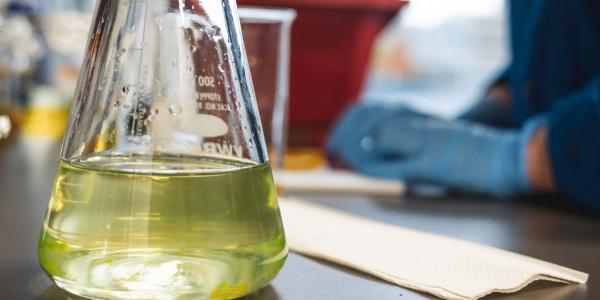

Graduate Program
The Department of Chemistry offers a PhD in Chemistry that prepares scientists for careers in research and teaching. The program offers pathways for graduate studies that span biological, organic, inorganic, physical, and nuclear chemistry. Key to the success of the students and the Chemistry PhD program is the strong interpersonal connections that develop between our students and the faculty and that often lead to new research directions and bridges being built between disciplines. As a result, doctoral students commonly pursue research at the interface of two or more subfields of chemistry. During the first semester of residence in the program, students are given the opportunity to explore research options within the department and to identify research mentors with common interests. The PhD requirements are kept to a minimum so that students can focus on scientific discover and building skillsets for successful careers.
WashU and the Department of Chemistry are proud of our faculty , of our facilities , of our research accomplishments and accolades, and of our educational reputation . Most of all, we are proud of our students, their successes in research, and their career endeavors. While the Chemistry PhD program is considered large, it is small enough that interactions between the hardworking, driven students and its passionate faculty provide invaluable experiences that contribute to the PhD experience.
The Graduate Program
Faculty and current students talk about the strengths of the department and Washington University
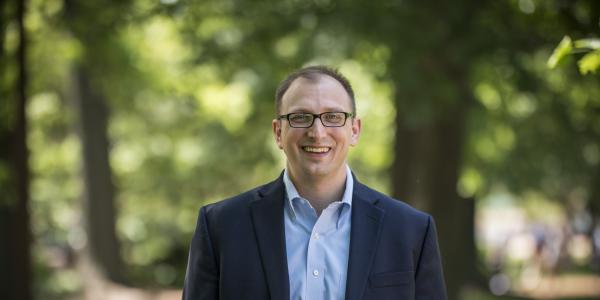
Wencewicz wins American Chemical Society Award

Next Frontiers in Radio Chemistry team wins an NIH grant to study bacterial infections of medical implants
An Incubator for Transdisciplinary Futures-funded team has won a $427,625 grant from the National Institutes of Health to study novel ways to detect bacterial infections that form around medical implants.
Program Highlights
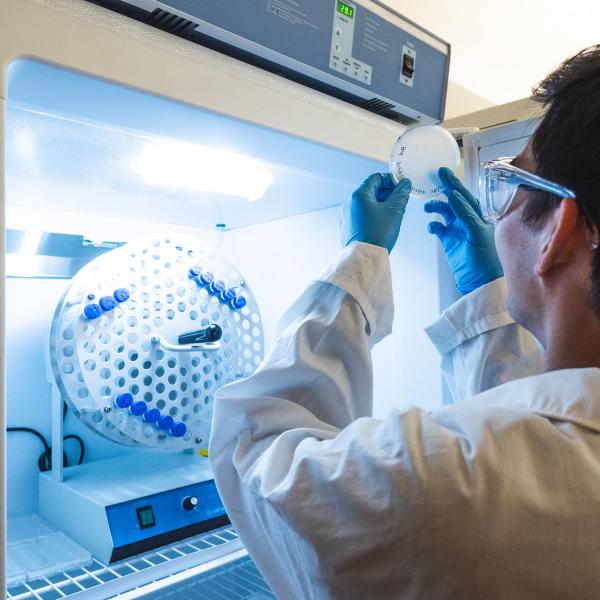
Interdisciplinary and Collaborative Research
As research knows no boundaries or titles, the Chemistry PhD program offers research and training opportunities in many sub-disciplines of chemistry, including magnetic resonance, materials and nanoscience, and laser spectroscopy. Current collaborations include those with faculty in Washington University's McKelvey School of Engineering, the School of Medicine, national laboratories, and scientists in industry.
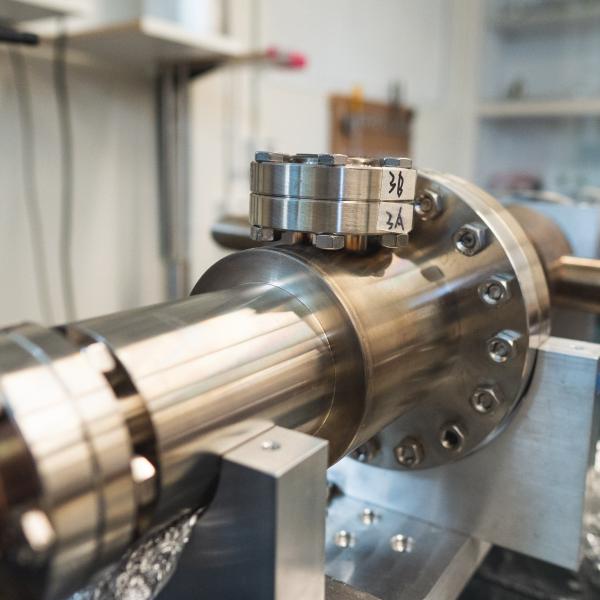
Research Resources, Facilities, and Instrumentation
Research at the forefront of science requires modern resources, facilities, and instrumentation. WashU has invested heavily in the research efforts in the Department of Chemistry to ensure students and faculty are able to pursue interdisciplinary research and explore novel directions. Most of the research in chemistry is located in six adjacent buildings on the Danforth Campus of WashU.
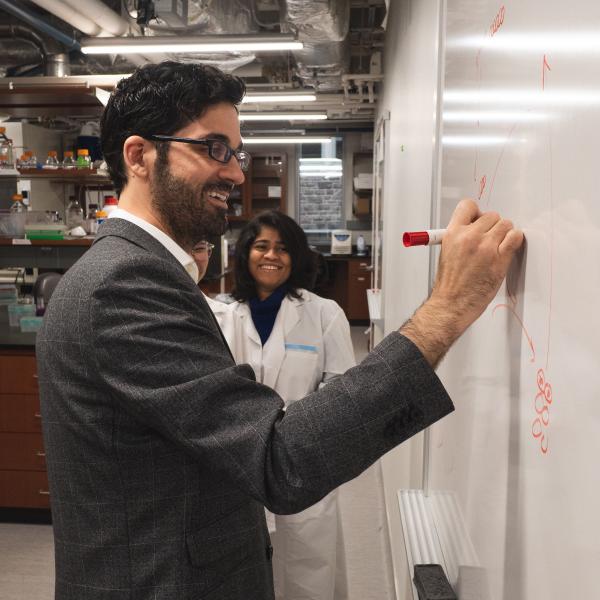
Excellent Academics and Training
Students are taught by research-active faculty in the classroom and in the laboratory so that modern concepts with applications in scientific discovery prepare students for careers in science. Most of the research groups in Chemistry are small enough so that faculty are intimately involved with ongoing research and progress of the students.
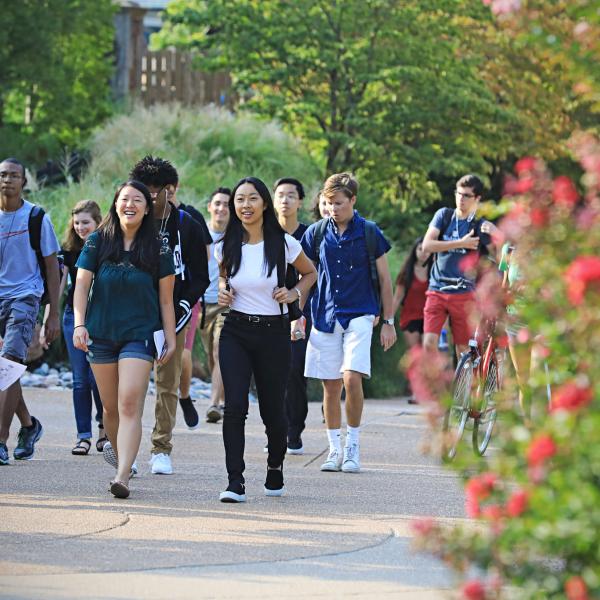
Collegiate Campus & Suburban Environment
Most of the research of the chemistry students and faculty occurs on the Danforth Campus of WashU, which is located just outside of the city of St. Louis. Although the interiors are of the buildings are state of the art, the exteriors are designed in a gothic style with Missouri red granite facades.
Financial Support
All Chemistry PhD students receive a generous stipend ($36,050 for the '24-25 twelve-month academic year) and a tuition fellowship for the duration of the program. Students also receive a 90% subsidy on health insurance. This support enables students to focus on their studies and scientific discovery without experiencing financial hardship.
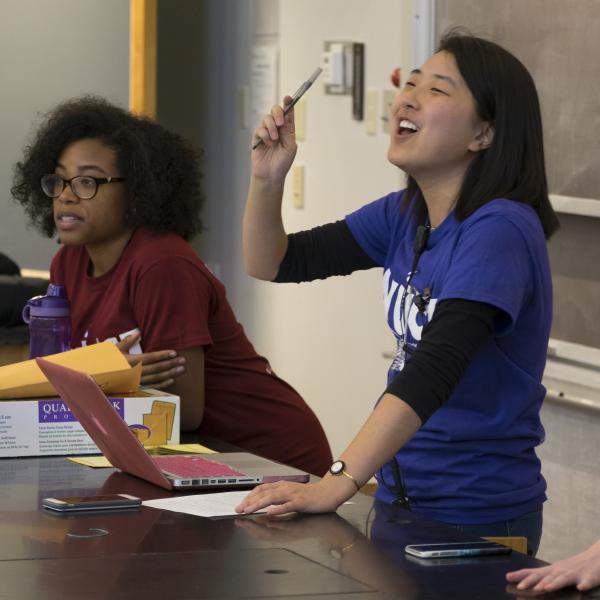
Outreach Opportunities
Students participate in outreach initiatives throughout the university and wider community, in particular with programs focusing on women in STEM and high school students interested in chemistry.
Prospective PhD Students
Interested in joining our department? Learn about candidacy requirements, financial assistance, and more. Much of the application process can be accomplished online.
Making the Move
Graduate students rave about St. Louis: it’s affordable, from housing to entertainment and culture. The Zoo, Missouri History Museum and St. Louis Art Museum all boast free admission, and our cost of living is consistently one of the lowest nationally. That means an excellent quality of life, even on a budget. Washington University also supports graduate students in their transition to St. Louis, from housing services to child care.
About St. Louis
Quadrangle Off-Campus Housing
Student Health Services
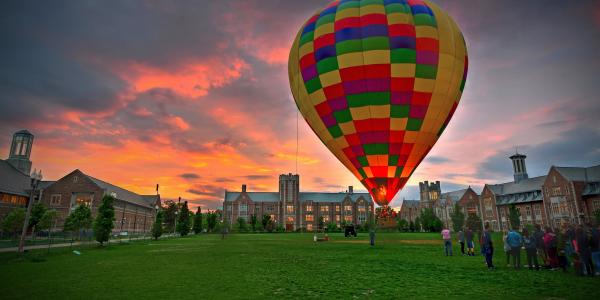
Graduate Student Resources
Find commonly used resources here, or search all Department of Chemistry resources.
Graduate School Forms
admissions, teaching, dissertation & more
PhD Degree Requirements (PDF)
find requirements specific to graduate study in chemistry
Graduate Application
learn how to apply online for the graduate program in chemistry
Graduate Student Docusign
Yearly Forms to Comptete
search more resources
Graduate school links, doctoral dissertation guide, office of graduate studies policies, graduate student groups, office of graduate studies resources, office for international students and scholars.
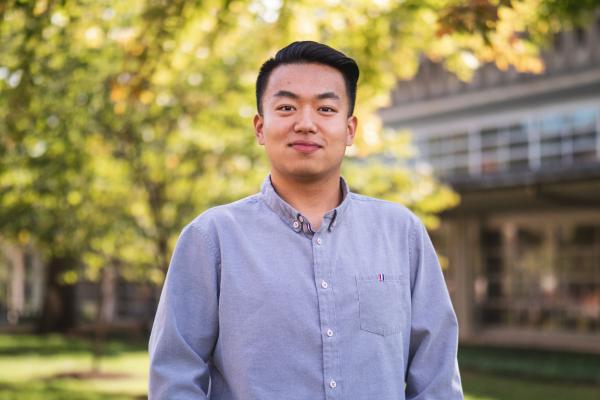
I still remember the first time when I met my advisor, Bryce Sadtler. He showed me around in lab and talked with me about research. I felt respected and that experience enhanced my motivation to do research. As a member of WashU chemistry department, everyone can befriend and support to each other in such unique community. Bryce and other professors in chemistry help me a lot with my courses and academic issues. Constructive suggestions and inspiring ideas coming from them show the direction to my success.
Have questions?
To learn more about the graduate program in chemistry, please contact the graduate coordinator, Barbara Taylor.

IMAGES
VIDEO
COMMENTS
The Chemistry Department is committed to providing salary/stipend and tuition for Chemistry Ph.D. students who are in good academic standing, working for chemistry professors. Chemistry students receive support from three different sources: Teaching Assistantships (TA), Research Assistantships (RA), and fellowships.
All students admitted to the PhD program receive full tuition coverage along with a monthly stipend for the first academic year, either through Teaching Fellowships, Research Assistantships, or fellowships. Students must be eligible to work in the United States in order to receive funding.
PhD Stipend Survey Results The living wage ratio (LW ratio) normalizes each gross pay entry to the local living wage. The purpose is to allow you to quickly compare the pay received by students at universities in different cost-of-living areas.
The University of Michigan PhD program offers cutting edge research in a collaborative environment. Top 15 Ranked Department. Among top-10 funded chemistry departments in the U.S. Outstanding Benefits -- competitive stipend with low cost of living; healthcare coverage for you and your dependents.
For the 2024–2025 academic year, the support package is valued at more than $125,000/year: 100% tuition scholarship: $84,564. Stipend: $36,500. Paid health insurance: $4,158. Graduate applicants are reviewed by both the department and the Graduate School for additional fellowship opportunities.
Students in good academic standing receive a 12-month stipend; fees and tuition are also provided. Support packages come from a variety of sources, including teaching and research assistantships, training grants, fellowships, and awards.
The fellowship provides a stipend for the first two years of the student’s program, and a research fund to be used in the course of the fellow’s graduate career. There are currently 10 fellowships available per year.
PhD Stipends. All PhD students receive a semi-monthly stipend payment to cover the basic cost of living in New Haven. The minimum annual stipends for the 2024-2025 academic year are: Humanities/Social Sciences: $49,538 stipend. Physical Sciences: $49,538 stipend.
Chemistry Ph.D. Program Support Policy. Our Ph.D. students (in good academic standing) currently receive an annual stipend of $34,000. In addition to the stipend, the full costs of tuition, fees, and health insurance are covered for all Ph.D. students.
All Chemistry PhD students receive a generous stipend ($36,050 for the '24-25 twelve-month academic year) and a tuition fellowship for the duration of the program. Students also receive a 90% subsidy on health insurance.